#Military Junta
Text
Nearly seven years after the Myanmar military killed thousands of Muslim Rohingyas, in what the UN called "textbook ethnic cleansing", it wants their help.
From interviews with Rohingyas living in Rakhine State the BBC has learned of at least 100 of them being conscripted in recent weeks to fight for the embattled junta. All their names have been changed to protect them.
"I was frightened, but I had to go," says Mohammed, a 31-year-old Rohingya man with three young children. He lives near the capital of Rakhine, Sittwe, in the Baw Du Pha camp. At least 150,000 internally displaced Rohingyas have been forced to live in IDP camps for the past decade.
In the middle of February the camp leader came to him late at night, Mohammed said, and told him he would have to do military training. "These are army orders," he remembers him saying. "If you refuse they have threatened to harm your family."
The BBC has spoken to several Rohingyas who have confirmed that army officers have been going around the camps and ordering the younger men to report for military training.
The terrible irony for men like Mohammed is that Rohingyas in Myanmar are still denied citizenship, and subjected to a range of discriminatory restrictions - like a ban on travel outside their communities.
In 2012 tens of thousands of Rohingyas were driven out of mixed communities in Rakhine State, and forced to live in squalid camps. Five years later, in August 2017, 700,000 fled to neighbouring Bangladesh, after the army launched a brutal clearance operation against them, killing and raping thousands and burning their villages. Some 600,000 of them still remain there.
Myanmar is now facing a genocide trial at the International Court of Justice in the Hague over its treatment of the Rohingyas.
That the same army is now forcibly recruiting them is a telling sign of its desperation, after losing huge swathes of territory in Rakhine recently to an ethnic insurgent group called the Arakan Army. Dozens of Rohingyas in Rakhine have been killed by military artillery and aerial bombardments.
The military has also suffered significant losses to opposition forces in other parts of the country - on Saturday it lost control of Myawaddy, a town on the eastern border with Thailand. Most of the country's overland trade passes through this vital route.
The junta has lost large numbers of soldiers as well. They have been killed, wounded, surrendered or defected to the opposition, and finding replacements is difficult. Few want to risk their lives propping up an unpopular regime.
And the Rohingyas fear that is the reason they are being targeted again - to be cannon fodder in a war the junta seems to be losing.
Mohammed said he was driven to the base of the 270th Light Infantry Battalion in Sittwe. Rohingyas have been prohibited from living in the town since they were driven out during the 2012 communal violence.
"We were taught how to load bullets and shoot," he said. "They also showed us how to disassemble and reassemble a gun."
In a video seen by the BBC another group of Rohingya conscripts can be seen being taught how to use BA 63 rifles, an older standard weapon used by the Myanmar armed forces.
Mohammed was trained for two weeks, then sent home. But after just two days he was called back, and put on a boat with 250 other soldiers and transported five hours up-river to Rathedaung, where a fierce battle with the Arakan Army was under way for control of three hilltop military bases.
"I had no idea why I was fighting. When they told me to shoot at a Rakhine village, I would shoot."
He fought there for 11 days. They were desperately short of food, after a shell fell on their supply hut. He saw several Rohingya conscripts killed by artillery and he was injured by shrapnel in both legs, and taken back to Sittwe for treatment.
On 20 March the Arakan Army released photos from the battle, after it had taken control of the three bases, showing several corpses, at least three of them identified as Rohingyas.
"While I was in the middle of the battle I was terrified the whole time. I kept thinking about my family," Mohammed said. "I never thought I would have to go to war like that. I just wanted to go home. When I got home from the hospital I hugged my mother and cried. It felt like being born again from my mother's womb."
Another conscript was Hussain, from Ohn Taw Gyi camp, which is also near Sittwe. His brother Mahmoud says he was taken away in February and completed his military training, but he went into hiding before they could send him to the front line.
The military denies using Rohingyas to fight its battles with the Arakan Army. General Zaw Min Tun, the junta spokesman, told the BBC that there was no plan to send them to the front line. "We want to ensure their safety, so we have asked them to help with their own defence," he said.
But in interviews with the BBC, seven Rohingyas in five different IDP camps near Sittwe all said the same thing: that they know of at least 100 Rohingyas who have been recruited this year and sent off to fight.
They said teams of soldiers and local government officials came to the camps in February to announce that the younger men would be conscripted, at first telling people they would get food, wages and citizenship if they joined up. These were powerful lures.
Food in the IDP camps has become scarce and expensive as the escalating conflict with the Arakan Army has cut off the international aid supplies. And the denial of citizenship is at the heart of the Rohingyas' long struggle for acceptance in Myanmar, and one reason they suffer systematic discrimination, described by human rights groups as similar to apartheid.
However, when the soldiers returned to take the conscripted men away, they retracted the offer of citizenship. When asked by the camp residents why they, as non-citizens, should be subjected to conscription, they were told that they had a duty to defend the place where they lived. They would be militiamen, not soldiers, they were told. When they asked about the offer of citizenship, the answer was "you misunderstood".
Now, according to one camp committee member, the army is demanding new lists of potential recruits. After seeing and hearing from the first group to come back from the front line, he said, no-one else was willing to risk being conscripted.
So the camp leaders are now trying to persuade the poorest men, and those with no jobs, to go, by offering to support their families while they are away, with donations raised from other camp residents.
"This conscription campaign is unlawful and more akin to forced labour," said Matthew Smith, from the human rights group Fortify Rights.
"There's a brutal and perverse utility to what's happening. The military is conscripting the victims of the Rohingya genocide in an attempt to fend off a nationwide democratic revolution. This regime has no regard for human life. It's now layering these abuses on top of its long history of atrocities and impunity."
By using Rohingyas in its battles against the advancing Arakan Army, the Myanmar military threatens to reignite communal conflict with the ethnic Rakhine Buddhist population, much of which supports the insurgents.
It was friction between the two communities which in 2012 caused the expulsion of tens of thousands of Rohingyas from towns like Sittwe. In 2017, ethnic Rakhine men joined in the army's attacks on the Rohingyas.
Tension between the two communities has eased since then.
The Arakan Army is fighting for an autonomous state, part of a wider campaign with other ethnic armies and opposition groups to overthrow the military junta and create a new, federal system in Myanmar.
Now on the brink of victory in Rakhine State, the Arakan Army has talked about giving citizenship to all who have lived there recently, implying that it might accept the return of the Rohingya population from Bangladesh.
The mood has now changed. A spokesman for the Arakan Army, Khaing Thukha, told the BBC that they viewed Rohingyas being conscripted to fight for the junta as "the worst betrayal of those who had recently been victims of genocide, and of those fighting for liberation from dictatorship".
Pro-military media have also been giving publicity to what appear to have been Rohingya protests in Buthidaung against the Arakan Army, although local people told the BBC they suspected these were organised by the army in an attempt to divide the two groups.
The Rohingyas are now forced to fight for an army that does not recognise their right to live in Myanmar, thereby alienating the ethnic insurgents who may soon control most of Rakhine. Once targeted by both, they are now caught between the two sides.
Mohammed has been given a certificate by the army, stating that he has fought in battle on their side. He has no idea what value it has, nor whether it exempts him from further military service. It could well get him into trouble with the Arakan Army if it continues its advance towards Sittwe and his camp.
He is still recovering from his injuries, and says he is unable to sleep at night after his experience.
"I'm afraid they will call me again. This time I came back because I was lucky, but next time I am not sure what will happen."
80 notes
·
View notes
Photo

Past and Current Military Junta Governments in the world
152 notes
·
View notes
Text
Sexual violence: the forgotten chapter of the military dictatorship of Brazil
Despite being present and constant, the sexual violence practiced by repression agents, authorized by the regime's top brass to torture any suspect, is hardly mentioned in history books and other more common records about the period. One of the challenges faced by consultants, academics and specialists who worked at CNV was precisely to bring these reports to light.
"Sexual violence is an unknown aspect of the military dictatorship. Even today, even after the publication of the CNV's final report, it is something that remains little known because it is a taboo topic and carries this extra burden when discussed", says Glenda Mezzaroba, scientist politician who coordinated the working group "Dictatorship and Gender" at the CNV and author of the book A reckoning with the future: amnesty and its consequences, a study of the Brazilian case . "
According to the political scientist, it was extremely important to conceptualize very well what can be considered sexual violence using the concepts of international bodies such as the World Health Organization. Especially because at the time of the military regime (and even today) the concept of sexual violence and rape are very focused on whether or not there was penetration. And the reports collected show that there was, indeed, sexual violence that did not necessarily involve penetration of the vagina or anus, "The majority of victims did not have the idea that being forced to be naked at the time of arrest is already sexual violence," explains. "We even observed that there were allegations of sexual violence in the book that Carlos Marighella published in 1965, reporting electric shocks to the genitals. However, there was not much clarity in the classification of this violence.
The chapter reserved for sexual violence in the final report of the National Truth Commission published in 2014, showed how the agents of repression had a macabre appreciation for the practice. In the reports, the initial act of stripping the prisoner naked and placing him in front of other agents and spectators was standard. Verbal humiliation, accusations and death threats against companions, family and friends then followed. Women were raped in front of their spouses as a way to get them to hand over information.
"I was there, I was vulnerable, completely vulnerable. Then the guy put his hand inside my clothes and then, well, like any other sexual abuse, I won't describe details, but that's what happened. His hand went through everything and I don't know what. He said: 'No, she's going to cum, with me she's going to cum and she's going to talk'. That's just normal people's stuff."
The excerpt above was taken from the testimony of Ieda Akselrud de Seixas, daughter of Minas Gerais militants, raped at DOI-CODI in 1971 when her entire family was arrested for involvement in revolutionary movements that fought against the military regime. Ieda, like several women and men, reports that it took some time to understand that the rape she suffered was also part of the military's torture method.
"But it took me a long time to realize that it was sexual abuse, do you know why? I minimized that episode because, after all, it wasn't a macaw's dick, it wasn't a shock and it wasn't a dragon's chair. That's really crazy! It's really crazy," she said.
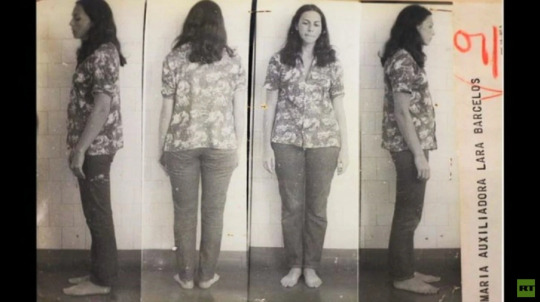
Maria Auxiliadora Lara Barcelos, known as "Dora", was arrested in 1969 and taken to the Army Police barracks , in Vila Militar , where she was stripped naked, beaten, and subjected to electric shocks on her breasts, vaginas and various parts of her body. She was banished to Chile in 1971, but had to leave the country because of the Pinochet dictatorship. Dora never recovered from the emotional consequences left by torture and committed suicide in 1976 at the age of 31 in West Berlin. Photo: Reproduction.
The simple fact that they were women, whether left-wing militants or not, was also a reason for the military to curse and verbally humiliate the captured women. The common sense was that they were to blame for being there, as it was far from their role as daughter, wife or mother. Gender hatred was evident. That's why they called them "whore", "slut" and any other adjective that is the counterpoint of saint. The only two roles applicable to women in the regime's view.
"Because you are a woman, you also realize that there is perhaps, sometimes, a much greater anger, I don't know if it is because of the question of thinking 'why is a woman doing this? Why is a girl doing this?' And it's a way, perhaps, of wanting to disqualify you in every way. In fact, the least you hear is that you're a 'cow' That's the way you're called," reported Maria. Aparecida Costa to CNV.

According to the final report, sexual violence was not occasional but rather widespread as a common practice throughout the repressive structure of the regime. "In the testimonies analyzed by the “Dictatorship and Gender” working group, DEIC, DOI-CODI, DOPS, Galeão Air Base, Army Police battalions, Casa da Morte (Petrópolis), Cenimar, CISA, police stations, Oban are mentioned. , military hospitals, prisons and barracks," says item 37 belonging to chapter 10 of the final report of the National Truth Commission.
In addition to the emotional scars that the torture left on the victims, there are still some who carried great guilt for having given up information about their companions during the torture sessions. This issue was also addressed by the team coordinated by Mezzaroba. In an anonymous statement, a woman reports the great guilt she felt after not having resisted the pain during torture and revealed information to the military. She was arrested at 19 years old.
"(…) We can hear in the speech of many of those who have gone through the experience of imprisonment and torture, referring to themselves, expressions such as “I resisted”, “I didn't inform on”, “I didn't turn anyone in”. Or, referring to others, expressions like: “he didn’t open anything”. (…) Expressions that, on the one hand, reflect the feeling of pride and honor of those who say them, also carry with them, implicitly, even if subtly, a painful accusation against those who say them. who, for some reason, didn't resist. Maybe they don't understand their pain," said the victim in her report.
Mezzaroba says that the owner of the above statement carried a load of guilt, apart from the inevitable psychological consequences of anyone who was a victim of torture promoted by the State. "She brought great pain, embedded in this logic that you should resist and not give anything away. In fact, everything that happens from the first violence in torture, nothing becomes the victim's responsibility after that. (…) she was the victim of unspeakable and incapable of measurement violence. Nothing that happens under torture is the responsibility of the victim. There, the human being no longer has control over his or her body. which is really important."
13 notes
·
View notes
Text
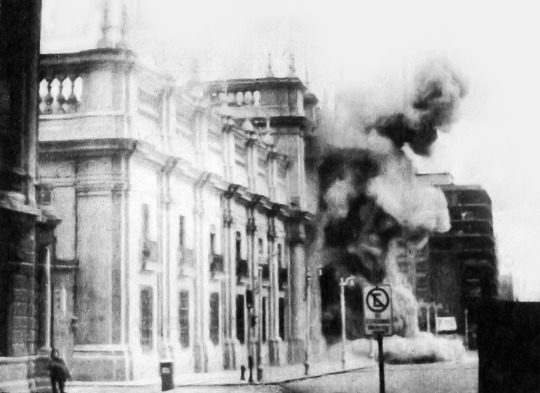
Bombing of La Moneda (presidential palace) on 11 September 1973 by the Chilean Armed Forces.
Armed forces put the country under military control. Little and unorganised civil resistance.
#Chilean coup d'état#Chile#La Moneda#presidential palace#September 11#1973#history#Chilean history#world history#70s#black and white#military junta#Salvador Allende#Augusto Pinochet#politics
3 notes
·
View notes
Quote
As the Burmese military junta wilts under growing global pressure, collapsing economy and mounting insurgencies, it will draw closer to China, which strongly backs the junta. The military regime has already cleared 15 mega infrastructure projects funded by China since the February 2021 coup, drawing Myanmar into a substantial Chinese debt trap. The Burmese generals are totally dependent on Chinese support to protect their back at the UN and in other global forums. With the Chinese entrenching themselves firmly in Myanmar’s economy and defence sectors, Indian worries over the security implications for its sensitive Northeast will grow.
Subir Bhaumik, ‘Myanmar issue bad news for act East thrust’, Indian Express
3 notes
·
View notes
Text
Russia extends Africa ambition to Niger as junta pushes US
Russia has been moving to expand its influence after the depature of France (BOUREIMA HAMA)
Moscow is vying for greater influence in Niger as the military junta moves to push out the United States, Russia’s latest swoop in the region as the West’s military presence thins.
The Niger military announced at the weekend it was breaking off an agreement with the United States “with immediate effect”,…
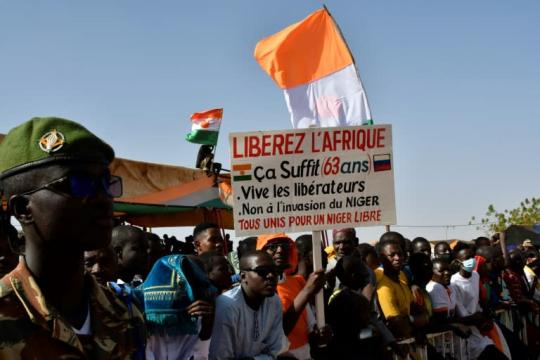
View On WordPress
#africa#Africa Corps#Christopher Faulkner#French colonies in Africa#French troops#Military junta#Moscow#Niger#Russia#Sahel region of Africa#United States
1 note
·
View note
Text
Rodolfo Walsh's Last Case by Elsa Drucaroff, translated by Slava Faybysh
Today I am sharing my thoughts on Rodolfo Walsh's Last Case by Esla Drucaroff, translated by Slava Faybysh, as part of the tour
@CorylusB
#books #bookstagram #rodolfowalshslastcase #historicalfiction #argentina #elsadrucaroff
Today I am sharing my thoughts on Rodolfo Walsh’s Last Case by Elsa Drucaroff, translated by Slava Faybysh. My thanks to Ewa and Corylus Books for inviting me to read the book for the tour and for providing a copy for review. Here’s what it’s all about:
Source: Advance Reader CopyRelease Date: 05 March 2024Publisher: Corylus Books
Continue reading Rodolfo Walsh’s Last Case by Elsa Drucaroff,…

View On WordPress
0 notes
Text
Why Burkina Faso, Mali, Niger Juntas Forge Sahel Military Alliance
Escaping France’s Grasp: How Burkina Faso, Mali, and Niger Juntas Ensure Security
As tensions rise within the Sahel region in Africa, Burkina Faso, Mali, and Niger have taken a remarkable step towards reclaiming their sovereignty and challenging the lingering influence of their former colonial power, France. In a historic move, the juntas of these three Sahel nations have forged an unprecedented…
View On WordPress
#Africa Sahel Region#African Countries#African People#Burkina Faso#Colonial Master#Colonial Power#Colonialists#Colonization#ECOWAS#France#French#French Colonialism In Africa#French Colonies#French Colony#Junta#Juntas#Legacy of French Colonialism In Africa#Mali#Military Junta#Niger#Sahel Military Alliance#Sahel Region
0 notes
Text
Exploring the African military junta's justification for seizing power over 50 years
The African continent, with its rich tapestry of cultures, histories, and nations, has witnessed a series of dramatic twists in governance over the past half-century. Among these, the rise and fall of military juntas have left an indelible mark on the political landscape.
These junta-led regimes, characterized by their abrupt seizure of power from civilian governments, have shaped nations,…

View On WordPress
0 notes
Text
A deadly stampede outside a passport office that took two lives and unending lines outside embassies - these are just some examples of what has been happening in Myanmar since the announcement of mandatory conscription into the military.
Myanmar's military government is facing increasingly effective opposition to its rule and has lost large areas of the country to armed resistance groups.
On 1 February 2021, the military seized power in a coup, jailing elected leaders and plunging much of the country into a bloody civil war that continues today.
Thousands have been killed and the UN estimates that around 2.6 million people been displaced.
Young Burmese, many of whom have played a leading role protesting and resisting the junta, are now told they will have to fight for the regime.
Many believe that this is a result of the setbacks suffered by the military in recent months, with anti-government groups uniting to defeat them in some key areas.
"It is nonsense to have to serve in the military at this time, because we are not fighting foreign invaders. We are fighting each other. If we serve in the military, we will be contributing to their atrocities," Robert, a 24-year-old activist, told the BBC.
Many of them are seeking to leave the country instead.
"I arrived at 03:30 [20:30 GMT] and there were already about 40 people queuing for the tokens to apply for their visa," recalled a teenage girl who was part of a massive crowd outside the Thai embassy in Yangon earlier in February. Within an hour, the crowd in front of the embassy expanded to more than 300 people, she claims.
"I was scared that if I waited any longer, the embassy would suspend the processing of visas amid the chaos," she told the BBC, adding that some people had to wait for three days before even getting a queue number.
In Mandalay, where the two deaths occurred outside the passport office, the BBC was told that there were also serious injuries - one person broke their leg after falling into a drain while another broke their teeth. Six others reported breathing difficulties.
Justine Chambers, a Myanmar researcher at the Danish Institute of International Studies, says mandatory conscription is a way of removing young civilians leading the revolution.
"We can analyse how the conscription law is a sign of the Myanmar military's weakness, but it is ultimately aimed at destroying lives... Some will manage to escape, but many will become human shields against their compatriots," she said.
Myanmar's conscription law was first introduced in 2010 but had not been enforced until on 10 February the junta said it would mandate at least two years of military service for all men aged 18 to 35 and women aged 18 to 27.
Maj-Gen Zaw Min Tun, the spokesperson for the military government, said in a statement that about a quarter of the country's 56 million population were eligible for military service under the law.
The regime later said it did not plan to include women in the conscript pool "at present" but did not specify what that meant.
The government spokesperson told BBC Burmese that call-ups would start after the Thingyan festival marking the Burmese New Year in mid-April, with an initial batch of 5,000 recruits.
The regime's announcement has dealt yet another blow to Myanmar's young people.
Many had their education disrupted by the coup, which came on top of school closures at the height of the Covid-19 pandemic.
In 2021, the junta suspended 145,000 teachers and university staff over their support for the opposition, according to the Myanmar Teachers' Federation, and some schools in opposition-held areas have been destroyed by the fighting or by air strikes.
Then there are those who have fled across borders seeking refuge, among them young people looking for jobs to support their families.
In response to the conscription law, some have said on social media that they would enter the monkhood or get married early to dodge military service.
The junta says permanent exemptions will be given to members of religious orders, married women, people with disabilities, those assessed to be unfit for military service and "those who are exempted by the conscription board". For everyone else, evading conscription is punishable by three to five years in prison and a fine.
But Robert doubts the regime will honour these exemptions. "The junta can arrest and abduct anyone they want. There is no rule of law and they do not have to be accountable to anyone," he said.
Wealthier families are considering moving their families abroad - Thailand and Singapore being popular options, but some are even looking as far afield as Iceland - with the hope that their children would get permanent residency or citizenship there by the time they are of conscription age.
Others have instead joined the resistance forces, said Aung Sett, from the All Burma Federation of Student Unions, which has a long history of fighting military rule.
"When I heard the news that I would have to serve in the military, I felt really disappointed and at the same time devastated for the people, especially for those who are young like me. Many young people have now registered themselves to fight against the junta," the 23-year-old told the BBC from exile.
Some observers say the enforcement of the law now reveals the junta's diminishing grip on the country.
Last October, the regime suffered its most serious setback since the coup. An alliance of ethnic insurgents overran dozens of military outposts along the border with India and China. It has also lost large areas of territory to insurgents along the Bangladesh and Indian borders.
According to the National Unity Government, which calls itself Myanmar's government in exile, more than 60% of Myanmar's territory is now under the control of resistance forces.
"By initiating forced conscription following a series of devastating and humiliating defeats to ethnic armed organisations, the military is publicly demonstrating just how desperate it has become," said Jason Tower, country director for the Burma programme at the United States' Institute of Peace.
Mr Tower expects the move to fail because of growing resentment against the junta.
"Many youth dodging conscription will have no choice but to escape into neighbouring countries, intensifying regional humanitarian and refugee crises. This could result in frustration growing in Thailand, India, China and Bangladesh, all of which could tilt away from what remains of their support for the junta," he said.
Even if the military does manage to increase troop numbers by force, this will do little to address collapsing morale in the ranks. It will also take months to train up the new troops, he said.
The junta had a long history of "forced recruitment" even before the law was enacted, said Ye Myo Hein, a global fellow at the Woodrow Wilson International Center for Scholars.
"So the law may merely serve as a facade for forcibly conscripting new recruits into the military. With a severe shortage of manpower, there is no time to wait for the lengthy and gradual process of recruiting new soldiers, prompting [officials] to exploit the law to swiftly coerce people into service," he said.
Even for those who will manage to escape, many will carry injuries and emotional pain for the rest of their lives.
"It has been really difficult for young people in Myanmar, both physically and mentally. We've lost our dreams, our hopes and our youth. It just can't be the same like before," said Aung Sett, the student leader.
"These three years have gone away like nothing. We've lost our friends and colleagues during the fight against the junta and many families have lost their loved ones. It has been a nightmare for this country. We are witnessing the atrocities committed by the junta on a daily basis. I just can't express it in words."
83 notes
·
View notes
Text
Exploring the African military junta's justification for seizing power over 50 years
The African continent, with its rich tapestry of cultures, histories, and nations, has witnessed a series of dramatic twists in governance over the past half-century. Among these, the rise and fall of military juntas have left an indelible mark on the political landscape.
These junta-led regimes, characterized by their abrupt seizure of power from civilian governments, have shaped nations,…

View On WordPress
0 notes
Text
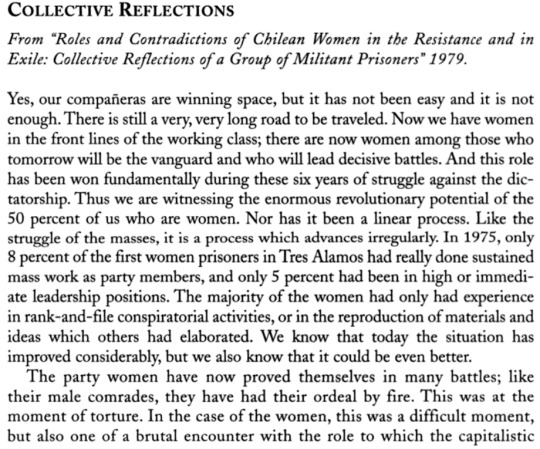
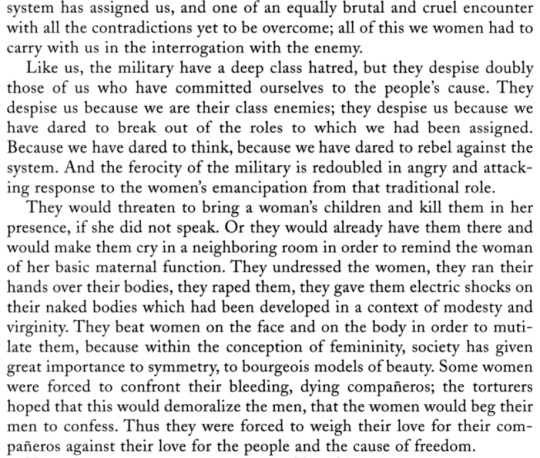
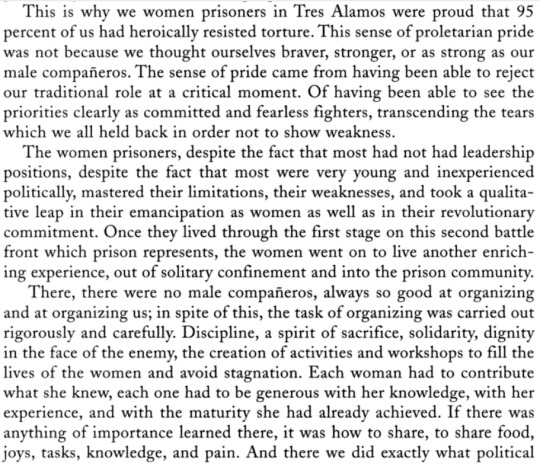
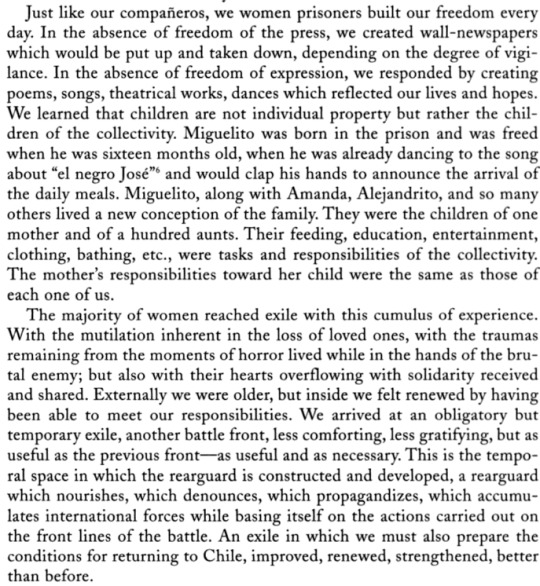
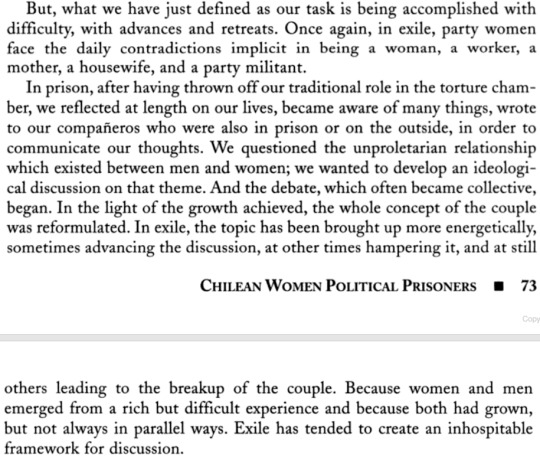
Wall Tappings: An International Anthology of Women's Prison Writings, 200 to the Present
Judith A. Scheffler
Feminist Press at CUNY, 2002
The Junta guards had no respect for the women political prisoners of Tres Alamos. Because they were mostly young women without leadership experience, the guards did not take their militant politics seriously. They sneeringly referred to the prison cell full of young women as "the harem". At Tres Alamos revolutionary women emerged from the prison showers to find all their plain clothing and underwear was stolen, and their only offering was a pile of skimpy lingerie. Done supposedly in the name of security so nothing could be hidden in those flimsy garments. Being so underdressed all the time was almost worse than being undressed. It gave the illusion of some covering, but no protection when guards would run their hands over their bodies. The guards euphemistically referred to their rapes as "pleasure sessions". Women would have to spend the entire night in bed with a guard under the misogynist belief that women can't revolt against men they are sleeping with. Armed with machismo, guards did not believe women they had repeated sexual intercourse with could still resist them.
Under these excruciating conditions of sexual humiliation, in which the full power of the Junta Fascist state was used to make militant women forget they were revolutionaries, they did not forget. They answered the class hatred of the guards with their own proletarian class hatred. They continued their Marxist workshops and study groups. Women in nothing but bras and tangas organized Party meetings and discussed strategies of resistance. In lingerie they discussed the intricacies of dialectical materialism.
Amazingly under these privations, they even created a prison Party cell wall newspaper. They did not forget the teachings of Lenin, that the newspaper is the organizing principle of the Party. And even in a prison that the guards had turned into a lingerie harem, disciplined compañeras put out a prison newspaper. The Junta severely estimated the strength of young women, who they thought would be easily tamed from tigresses into submissive kittens. Their militant defiant spirit and disciplined organization lived on under the most degrading of circumstances. "Dignity in the face of the enemy".
14 notes
·
View notes
Text

Adriana Calvo* is leaving the stand after giving her testimony at the trial of Argentinian senior military commanders. She was one of the thousands of victims of Argentina's junta (1976–1983), who had been brutally tormented for their political activities. She gave birth to her child while being handcuffed by her torturers.
🎞film: Argentina, 1985 (2022)
🎬director: Santiago Mitre
🟣🟣🟣⚪️⚪️
*This role has been superbly played by actress Laura Paredes.
0 notes
Text
while we're celebrating the good news about an ex-pope that sucked, i wanted to link to some context about his replacement
Francis I, the pope who gets lots of kudos for being more liberal than Benedict XVI,
-has political ties to the Argentine military junta, specifically to P2's Admiral Emilio Massera¹
-called trans bodies "nuclear weapons" who exist as sins against "the design of the Creator [that] is written in nature"²
source
1.
2.
#APAB#the pope#pope francis#transphobia#emilio massera#military junta#fascists of the literal operation gladio variety#jorge bergoglio is a garbage human being who has been and continues to protect ordained sex offenders#queers don't owe him shit just because he's politically savvy enough to say he doesn't hate us
0 notes
Text
MALI DEMANDS EMERGENCY UN MEETING OVER FRENCH 'AGGRESSION'
MALI DEMANDS EMERGENCY UN MEETING OVER FRENCH ‘AGGRESSION’
Mali has requested an emergency UN Security Council meeting to stop what it calls French “acts of aggression,” including alleged espionage and violations of sovereignty, and accused France of supporting jihadists, AFP reported on Wednesday.
In a letter seen Wednesday by AFP, Foreign Minister Abdoulaye Diop told the Chinese presidency of the Security Council that Mali “reserves the right to use…

View On WordPress
0 notes
Text
[Burmese->English] @thet_mar_phyo August 4th 2022 Instagram Post - Color Coded Translation
Content Warning: War, Death

PDF (KALAY) Battalion 6
၀၃-၀၈-၂ဝ၂၂ ရက် ကလေးမြို့
0 3- 0 8- 2 w 2 2 raat kalayy myahoet
သာယာကုန်းရွာ တိုက်ပွဲတွင် ကျဆုံးသွား
saryarkone rwar titepwal twin kya soneswarr
သော ရဲဘော် ဝေမင်းသော
saw rellbhaw way mainn saw
—
PDF (KALAY) Battalion 6
On 03-08-2022, Brother-in-arms Wai Min Thaw, has fallen in the battle of Tharyakone Village, Kalay City
—
Literal Translation:
PDF (KALAY) Battalion 6
03-08-2022/Day/Kalay/City/Tharyakone/Village/battle/in/fall/passed away/that/comrade/Wai Min Thaw
POST DESCRIPTION:
Wai Min Thaw, a 19-year-old comrade from Battalion-6 of Kalay PDF, was killed by artillery shelling during fighting between local defense forces & junta troops in TharyarKone village, Sagaing's Kalay tsp. #2022Aug4Coup #Whats HappeningInMyanmar
—
Rest In Peace Wai Min Thaw
—
Please correct me if I made a mistake
#myanmar#what’s happening in myanmar#whatshappeninginmyanmar#burmese#Burmese to English#English to Burmese#myanmar junta#myanmar protest march#myanmar spring revolution#myanmar prisoners#Myanmar pdf#Peoples Defense Force#Burma#myanmar death sentences#war news#military junta#learn Burmese#color coded translation#burmese language#minority language#minority languages#Burmese langblr#PDF myanmar#study burmese#Burmese revolution#military coup#myanmar military coup#polyglot thought translation
1 note
·
View note